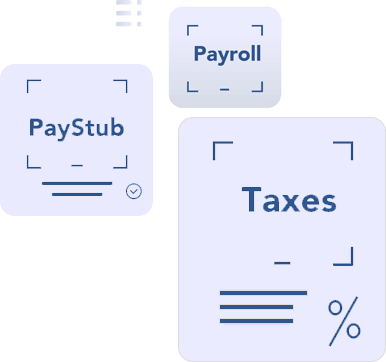How to DIY Independent Contractors Payroll?
- Updated on Feb 08, 2023 - 11:00 AM by 123PayStubs TeamIn recent times, most businesses prefer to hire more independent contractors or gig workers instead of regular employees. Hiring independent contractors can not only save you money on benefits and taxes but also let you focus more on the business as you don’t have to worry about handling taxes and payroll much.
Table of Contents
- Who are independent contractors?
- Hiring an independent contractor
- Benefits of hiring independent contractors
- How can you pay your contractors?
-
Filing information returns
- Reporting nonemployee compensation
- Reporting other payments
- How 123PayStubs can help?
Who are independent contractors?
Independent contractors, an individual or a company, are hired temporarily for providing certain services and are not part of the company. You need not pay or file taxes on their behalf. And, if you pay more than $600 in a year, you’ll have to file a 1099 form like W-2 for regular employees (just once a year). In reference to their 1099, contractors will file taxes for them. If you’re confused about whether a worker is an employee or contractor, you may file Form SS-8, Determination of Worker Status for Purposes of Federal Employment Taxes and Income Tax Withholding, with the IRS and they’ll determine it for you.
Hiring an independent contractor
Though there’s not much you have to do while hiring an independent contractor, there are quite a few things you need to know about. Unlike employees, you are not going to withhold and pay taxes, but you’re going to file 1099 at the end of the year listing the payments made to them. Like W-4 for employees, you have to collect their information including their TIN info through Form W-9 after hiring. It’s only for your record and you don’t have to file this with any government agencies. If a contractor doesn’t provide you with Form W-9 with valid information, you may file 1099 with the IRS without mentioning their TIN or writing “Refused to provide”. Upon which, the IRS may send you a notice to withhold backup withholding from their earnings.
Benefits of hiring independent contractors
As we see, there are plenty of advantages to choosing independent contractors over traditional employees. Businesses save almost 40% on labor costs while hiring independent contractors. Here are some of the major benefits:
- No training needs to be given; thus, reducing training costs
- No regular benefits like paid holidays and health insurance
- No tax withholdings and payments
- No messed-up payroll calculations
- No quarterly tax filings
- And most importantly, you save more money
How can you pay your contractors?
Contractors are paid based on the work done and most contractors are paid based on an hourly or flat rate. And, in some cases, it could be pay per load, piece, etc. You can pay them anytime you want, not on a regular schedule.
You may pay a contractor through multiple payment methods. So, during hiring, it’s better to discuss and confirm the payment mode too. The most common methods are cash, check, and direct deposit. No matter which payment mode you choose, it’s always safe to provide a receipt for each cash transaction. You may also choose to provide a pay stub or payment statement for the payments made to contractors. There are some professional online pay stub generators like 123PayStubs that let you create a pay stub for contractors too. This would both help you track the payments made and act as a receipt (both for you and the contractors).
Filing Information Return with the IRS - Form 1099
At the end of the year, you must file all the payments made to independent contractors over the year through Form 1099. Although there are 20 different variations of this form, Form 1099-MISC is commonly used. The IRS Form 1099-MISC summarizes all the income an independent contractor receives in a year and must be filed with the IRS. This will help them match the income they report on their tax returns.
Reporting Nonemployee Compensation - Form 1099-NEC
However, the IRS has revived Form 1099-NEC, Nonemployee Compensation, to report nonemployee compensation only. Through this form, you can report fees, commissions, awards, prizes, and other compensations paid for services. So, if you’ve paid an independent contractor more than $600 in a year for the aforementioned things, you should report on Form 1099-NEC instead of Form 1099-MISC. Make sure to file the form with the IRS before January 31st.
Reporting Other Payments
Other than nonemployee compensation, you have to report the payments in Form 1099-MISC. You must send out the 1099-MISC forms to the respective contractors before January 31st. Then, the contractors, after reviewing, may reach out to you if there are any corrections. If everything’s set, you may file the form with the IRS either electronically or by the paper on or before January 31st. If the deadline falls on a federal holiday or a weekend, the next business day would be the due date.
The IRS also imposes penalties for late filings of information returns on a timely basis. Below are the penalty rates based on the time of filing:
- If you file the returns not more than 30 days late, you’ll be penalized $50 per form ($556,500,000 max)
- If you file the returns more than 30 days late and before August 31, you’ll be penalized $110 per form ($1,669,500 max)
- If you file after August 31, the penalty amount will be $270 per form ($3,339,000 max)
How 123PayStubs can help?
Filing 1099s is simple if you’ve been creating pay stubs for contractors through 123PayStubs. The information for these forms will be automatically populated based on the pay stubs you generated. You’ll just have to verify the information, and your forms will be filed electronically with the IRS.
Still have questions about our online paystub generator?
Reach out our customer support team by chat or email for any questions that you may have regarding our paystub generator.





